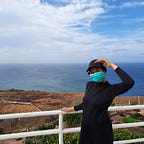COVID 19 and Foreign Nationals:
How the Indonesian Government is Working on the Principle of Humanity
COVID-19 affected our lives in many aspects. Multidisciplinary studies were conducted to measure its impact to our society, including on the field of international relation.
We are well aware of the high-profile diplomacy during the pandemic, such as cooperation in obtaining vaccine, re-opening of the borders and economic activities through the travel corridor arrangement, as well as the protection of Indonesians abroad affected by COVID-19.
Less publicly reported, but no less crucial, are the circumstances of foreign nationals in Indonesia at this critical time and the Indonesian government’s assistance to date.
When the outbreak firstly announced in early March 2020, there were an estimated 150 thousand foreigners, residing or traveling in Indonesia, and some of them could not go back to their origin country because of the lockdown policy imposed globally.
Some foreigners are even traveling on very limited resources attending religious pilgrimage such as the Global Ijtima Gathering in Gowa Sulawesi, which left them in isolation and even exposed into a new COVID-19 cluster.
Others are trapped in resorts and diving guest houses in the remote islands of Raja Ampat, West Papua Province, with nowhere to go as airlines shut down and commercial sea lines canceled their trips.
Being trapped on a foreign country with a limited resource, and restricted movement due to social distancing measures, was a nightmare for many foreign national in Indonesia, thus, the provision of consular services for embassies became an essential measure in ensuring: the safety and health condition of their nationals, the up to date condition of their nationals as well ensuring the safe passage of repatriation.
In line with the main spirit the Indonesian diplomacy, consular services are given on basis of humanitarian consideration, on top of the legal reference to the Vienna Convention on Diplomatic Relations (VCDR) 1961 and Vienna Convention on Consular Relations (VCCR) 1963.
Consular services are also given on the most traditional form of diplomacy that is “reciprocity”, the smooth process of evacuating Indonesians abroad is always base on a concerted and highly coordinated effort between the various agencies dealing with foreign nationals in Indonesia.
During the period of this great global pandemic, to ease up travel and immigration regulation affected by many Indonesian abroad, the Indonesian government had consecutively issued: Minister of Legal Affairs and Human Rights Regulation №11 of 2020 and Circular Note of Director-General of Immigration No. IMI-GR.01.01–4049 dated August 14th 2020 regarding Extensions of the Due Date for Emergency Stay Permit Holders to apply for Immigration Stay Permit.
Foreigners who cannot return to their respective countries were entitled to stay until they can find flights, without overstay penalties. This was a great relief for foreigners staying in remote are of the country.
The Ministry facilitated the tedious process of self-repatriation for more than 100 foreigners stuck in various parts of the islands, such as in the regencies of Raja Ampat and Mentawai during the large-scale social distancing period.
The country also welcomed consecutively 99 and later on 300 Rohingya refugees, on July 1st and Sept 7th, 2020. This includes in deploying a team to Aceh in order to monitor their up to date condition. As part of the result, all of the Rohingya people in Aceh has was granted refugee status by the in UNHCR.
Until the end of August 2020, the Ministry issued 1,570 notification and provided 451 consular access to foreigners. Assisted and closely monitored 1,044 foreign nationals infected and affected directly by COVID-19, facilitated 216 repatriation flights with more than 13,823 passengers.
During the time of high crisis, the Indonesian Diplomacy has work in full gear, not only swiftly, but also highly coordinated, and most importantly give a direct benefit to the Indonesian people. The high stake of Consular Diplomacy that are based on humanity and reciprocity will likely to continue next year.
